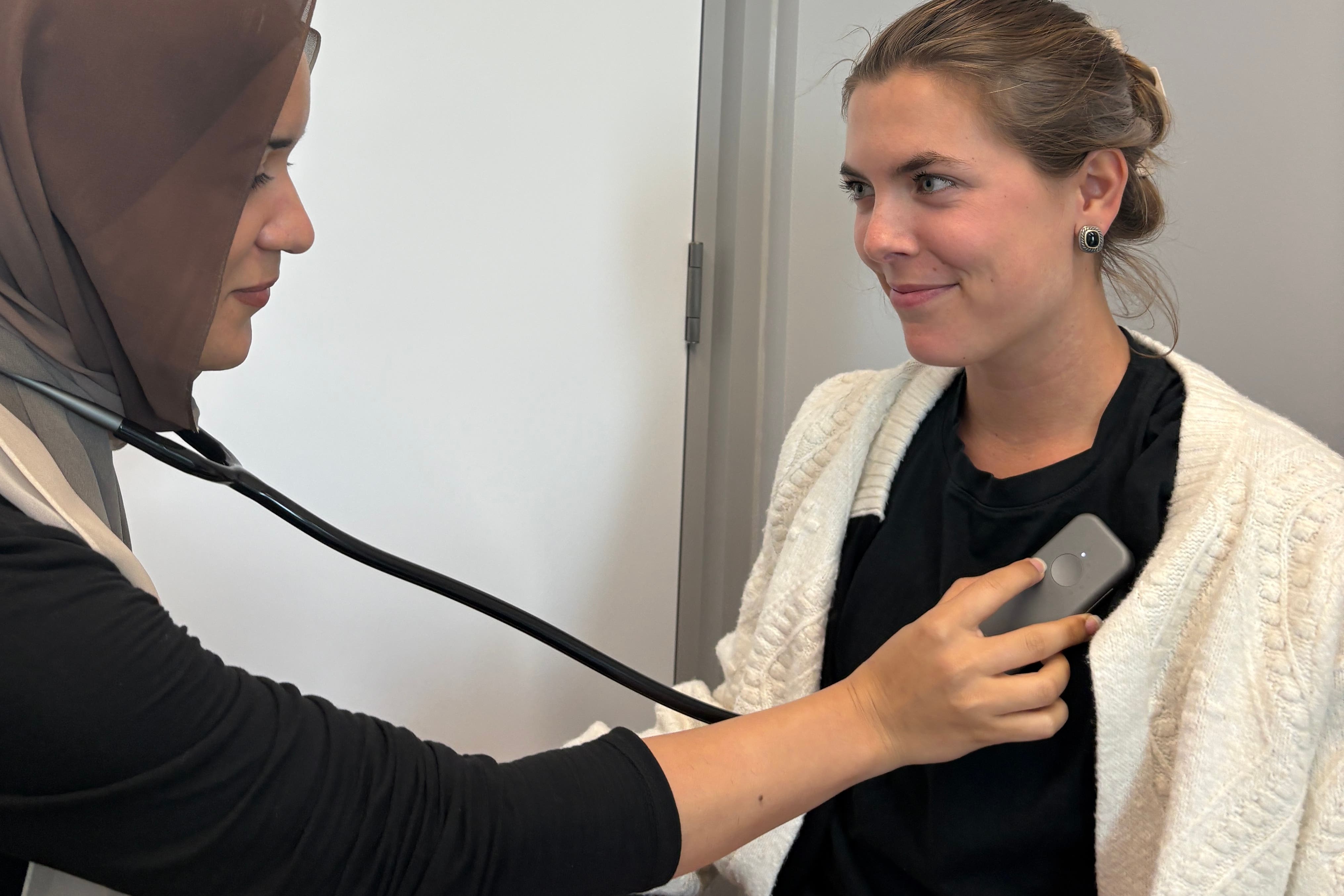Stethoscopes powered by artificial intelligence (AI) could help medics detect three different heart conditions in seconds, according to researchers.
The technology can analyse subtle differences in heartbeats and blood flow that human ears cannot pick up, all while performing a rapid test to record the electrical activity in the heart at the same time.
Experts suggest this use of AI could be a “real game-changer”, enabling earlier treatment for patients with heart failure, heart valve disease and abnormal heart rhythms, also known as atrial fibrillation.
The stethoscope, invented in 1816, allows doctors to listen to the internal sounds of a patient’s body. Its chest piece – the part of the tool which is placed on the body – includes a “bell”, a small cup-shaped device used to hear low-frequency sounds from the heart.

The new AI stethoscope has been “upgraded for the 21st century” and replaces this chest piece with a device around the size of a playing card.
This is placed on a patient’s chest to take an ECG (electrocardiogram) – which records electrical signals from the heart – with a microphone recording the sound of blood flowing through the heart.
This information is then sent to the cloud and analysed by AI trained on data from tens of thousands of people. A test result flagging if a patient is at risk of heart failure or not is then sent to a smartphone.
Another algorithm can detect atrial fibrillation, which often has no symptoms but can increase the risk of strokes.
Dr Sonya Babu-Narayan, clinical director at the British Heart Foundation (BHF) and consultant cardiologist, said: “This is an elegant example of how the humble stethoscope, invented more than 200 years ago, can be upgraded for the 21st century.
“We need innovations like these, providing early detection of heart failure, because so often this condition is only diagnosed at an advanced stage when patients attend hospital as an emergency.
“Given an earlier diagnosis, people can access the treatment they need to help them live well for longer.”
The study, led by Imperial College London and Imperial College Healthcare NHS Trust, involved more than 200 GP surgeries in London.
The AI stethoscope was trialled on those with certain symptoms – breathlessness, fatigue or swelling of the lower legs or feet, which are all signs of heart failure.
Some 12,725 patients from 96 surgeries were examined with the AI stethoscope and were then compared to patients from 109 GP surgeries where the technology was not used.
Researchers found those examined with the device were 2.33 times more likely to be diagnosed with heart failure in the next 12 months.
Meanwhile, the stethoscope was 3.45 times more likely to pick up cases of atrial fibrillation, and 1.92 times more likely to diagnose heart valve disease, when one or more of the heart’s four valves do not work properly.
Dr Mihir Kelshiker, a member of the research team from Imperial College London and Imperial College Healthcare NHS Trust, said: “Most people with heart failure are only diagnosed when they arrive in A&E seriously ill.
“This trial shows that AI-enabled stethoscopes could change that – giving GPs a quick, simple tool to spot problems earlier, so patients can get the right treatment sooner.”
Dr Patrik Bachtiger, of Imperial College London’s National Heart and Lung Institute and Imperial College Healthcare NHS Trust, added: “The design of the stethoscope has been unchanged for 200 years – until now.
“So it is incredible that a smart stethoscope can be used for a 15-second examination, and then AI can quickly deliver a test result indicating whether someone has heart failure, atrial fibrillation or heart valve disease.”
The findings of the trial, known as Tricorder, are being presented at the European Society of Cardiology (ESC) Congress in Madrid.
Researchers are now planning to roll out the stethoscopes to GP practices in Wales, south London and Sussex.
Professor Mike Lewis, scientific director for innovation at the NIHR, which supported the study, said: “This tool could be a real game-changer for patients, bringing innovation directly into the hands of GPs.
“The AI stethoscope gives local clinicians the ability to spot problems earlier, diagnose patients in the community, and address some of the big killers in society.”
Professor Nicholas Peters, senior investigator from Imperial College London and consultant cardiologist at Imperial College Healthcare NHS Trust, added: “Our study shows that three heart conditions can now be identified in one sitting.
“Importantly, this technology is already available to some patients and being widely used in GP surgeries.”






